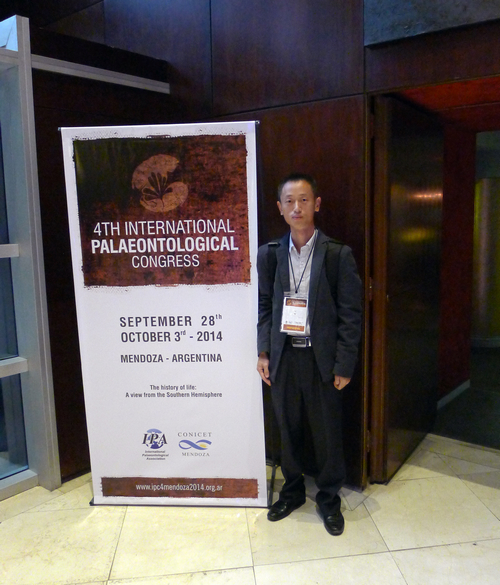The 4thInternational Palaeontological Congress was held in Mendoza, Argentina, from September 28 to October 3, 2014. The conference was hosted by the Centro Científico Tecnológico CONICET Mendoza and partner organizations. It brought together more than 1000 participants from around the world.
The International Palaeontological Congress (IPC) is a global meeting devoted to Palaeontology throughout the world. It convenes every four years under the aegis of the International Palaeontological Association. The three previous editions were held in Sydney (2002), Beijing (2006) and London (2010) respectively. A variety of meeting styles including a combination of plenary lectures, symposia on leading issues, interactive workshops, technical sessions and short courses were available at the 4th IPC.
Dr. SU Tao of XTBG participated in the meeting and made an oral presentation entitled “Resilience of plant-insect interactions in an oak lineage through Quaternary climate change”.
The abstract of the presentation is as following:
Plant-insect interactions are vital for structuring terrestrial ecosystems. It is still unclear how climate change in deep time might have shaped plant-insect interactions leading to modern ecosystems. We investigated the effect of Quaternary climate change on plant-insect interactions by observing insect herbivory on leaves of an evergreen sclerophyllous oak lineage (Quercus section Heterobalanus, HET) from a late Pliocene floraand eight living forests in SW China. Damage diversity is lower in the fossil florathan in modern HET populations, even a warmer climate than the present day. All damage types in the fossil flora,except for one distinctive gall type, can be found in modern HET populations. These results indicate Quaternary climate change did not cause extensive extinction of insect herbivores in HET forests. The accumulation of a more diverse herbivore fauna over time supports the view of plant species as evolutionary ‘islands’ for colonization and turnover of insect species.

Dr. SU Tao at the 4th IPC

